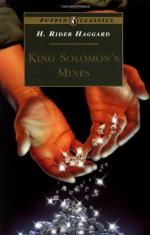At Inyati, the outlying trading station in the Matabele country, of which Lobengula (a great and cruel scoundrel) is king, with many regrets we parted from our comfortable wagon. Only twelve oxen remained to us out of the beautiful span of twenty which I had bought at Durban. One we lost from the bite of a cobra, three had perished from “poverty” and the want of water, one strayed, and the other three died from eating the poisonous herb called “tulip.” Five more sickened from this cause, but we managed to cure them with doses of an infusion made by boiling down the tulip leaves. If administered in time this is a very effective antidote.
The wagon and the oxen we left in the immediate charge of Goza and Tom, our driver and leader, both trustworthy boys, requesting a worthy Scotch missionary who lived in this distant place to keep an eye on them. Then, accompanied by Umbopa, Khiva, Ventvoegel, and half a dozen bearers whom we hired on the spot, we started off on foot upon our wild quest. I remember we were all a little silent on the occasion of this departure, and I think that each of us was wondering if we should ever see our wagon again; for my part I never expected to do so. For a while we tramped on in silence, till Umbopa, who was marching in front, broke into a Zulu chant about how some brave men, tired of life and the tameness of things, started off into a vast wilderness to find new things or die, and how, lo and behold! when they had travelled far into the wilderness they found that it was not a wilderness at all, but a beautiful place full of young wives and fat cattle, of game to hunt and enemies to kill.
Then we all laughed and took it for a good omen. Umbopa was a cheerful savage, in a dignified sort of way, when he was not suffering from one of his fits of brooding, and he had a wonderful knack of keeping up our spirits. We all grew very fond of him.
And now for the one adventure to which I am going to treat myself, for I do dearly love a hunting yarn.
About a fortnight’s march from Inyati we came across a peculiarly beautiful bit of well-watered woodland country. The kloofs in the hills were covered with dense bush, “idoro” bush as the natives call it, and in some places, with the “wacht-een-beche,” or “wait-a-little thorn,” and there were great quantities of the lovely “machabell” tree, laden with refreshing yellow fruit having enormous stones. This tree is the elephant’s favourite food, and there were not wanting signs that the great brutes had been about, for not only was their spoor frequent, but in many places the trees were broken down and even uprooted. The elephant is a destructive feeder.
One evening, after a long day’s march, we came to a spot of great loveliness. At the foot of a bush-clad hill lay a dry river-bed, in which, however, were to be found pools of crystal water all trodden round with the hoof-prints of game. Facing this hill was a park-like plain, where grew clumps of flat-topped mimosa, varied with occasional glossy-leaved machabells, and all round stretched the sea of pathless, silent bush.




